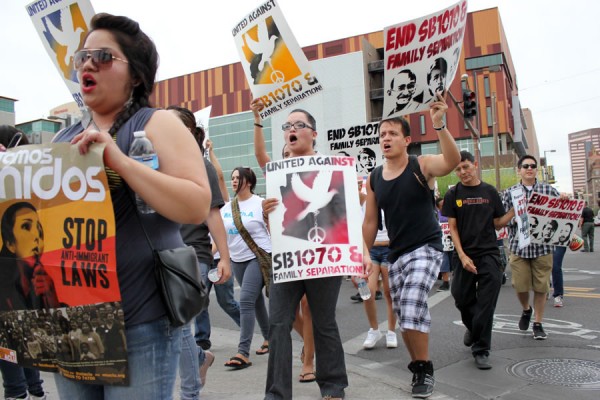Arizona Immigration Law: Supreme Court Rules Mostly in Favor of Federal Government

Today, the U.S. Supreme Court ruled majority in favor of the federal government in the case of Arizona's immigration law, but sustained the most controversial stipulation that allows police to continue checks on people’s immigration statuses while enforcing other laws.
The court considered the four main issues the US government raised with the pending legal status of the Arizona immigration law. Subsequently, the court voted 5 to 3, favoring three of the four issues on behalf of the federal government.
"The national government has significant power to regulate immigration," Justice Anthony Kennedy wrote in the majority opinion.
"Arizona may have understandable frustrations with the problems caused by illegal immigration while that process continues, but the state may not pursue policies that undermined federal law."
The three Arizona provisions struck down by the court, in favor of the US government, included:
1. Authorizing police to arrest immigrants, without warrant, where "probable cause" they committed any public offense exists, making them removable from the country.
2. Making it a state crime for "unauthorized immigrants" who fail to carry registration papers and other government identification.
3. Forbidding those not authorized for employment in the United States to apply, solicit or perform work. That would include immigrants standing in a parking lot who "gesture or nod" their willingness to be employed.
However, the High Court “threw a bone” to Arizona legislators by upholding the one of the most controversial provisions that allowed the continued practice of police officers employing immigration status checks on people, while enforcing other laws if police suspect "reasonable suspicion" that the person is in the United States illegally.
Although the court protected the provision, the justices warned it could face future constitutional challenges depending on how the state implements the provision.
Recently, President Obama gave a speech about his immigration policy. In response to the Supreme Court’s ruling, Obama made reference in a statement to points he addressed in his previous comments on immigration policy.
"I am pleased that the Supreme Court has struck down key provisions of Arizona's immigration law. What this decision makes unmistakably clear is that Congress must act on comprehensive immigration reform. A patchwork of state laws is not a solution to our broken immigration system – it’s part of the problem."
However, in Obama’s statement, he alluded to potential constitutional challenges the controversial provision the court upheld on behalf of Arizona’s bill, by expressing trepidation in his statement in regards to the provision.
“At the same time, I remain concerned about the practical impact of the remaining provision of the Arizona law that requires local law enforcement officials to check the immigration status of anyone they even suspect to be here illegally. I agree with the Court that individuals cannot be detained solely to verify their immigration status. No American should ever live under a cloud of suspicion just because of what they look like.”
The ruling will likely set a strong precedent for other states considering similar laws, as well as implicate their ability to legislate. Through the court’s decision, the justices made clear today that immigration laws are mostly federal functions and not entirely up to individual states' legislators.
Today’s ruling will not be the last time we hear of Arizona’s immigration law, SB1070. The bill will most likely be in headlines again concerning the uncertain future of one of its most contentious provisions.




